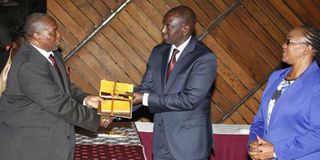PSC creates formula to ensure ethnic diversity in civil service

DP William Ruto (centre) receives a report during the PSC awards in 2017. PSC has developed a formula that will guide recruitment in the public service in order to promote ethnic diversity. FILE PHOTO | NATION MEDIA GROUP
What you need to know:
According to the formula, the recruitment of members of the Kikuyu community will be limited to 17 per cent.
Those of the Luhya community will be limited to 13 per cent, with Kalenjin taking 12.8 per cent and Luo 10 per cent.
The Luo, Kamba and Kisii tribes each have a representation of 10.4 per cent, 10.3 per cent and eight per cent in that order.
The Public Service Commission (PSC) has developed a formula that will guide recruitment in the public service in order to promote ethnic diversity.
The formula, which was handed over to the National Assembly committee on Administration and National Security, seeks to cap the country’s 45 communities, in the public service, proportional to their national population strength as a way of enhancing opportunities for all Kenyans.
According to the formula, the recruitment of members of the Kikuyu community will be limited to 17 per cent places in the public service, while those of the Luhya community will be limited to 13 per cent, with Kalenjin taking 12.8 per cent and Luo 10 per cent.
NCIC REPORT
The National Cohesion and Integration Commission (NCIC) has in the recent past published a report that shows that five main ethnic groups dominate employment in the public service, and the decision by the PSC to develop the criteria is aimed at addressing the problem.
The formula was presented to the House team by Commissioner Patrick Gichohi when he led the PSC to make submission on the 2018/19 budget proposal for the commission.
Mr Gichohi asked the committee to look at the formula and invite the commission to interrogate with a view of either formalising it or developing legislation to address the constant complaints regarding the domination of the public service by some ethnic groups.
The Capacity Assessment and Rationalisation of the Public Service (Carps) report developed in 2015 shows that 77 per cent of all public service positions are held by six communities, leaving the rest of the tribes to share 23 per cent of positions.
The report, which was prepared by the intergovernmental steering committee for Carps, did a breakdown of all ethnic groups.
LION'S SHARE
Out of those, the report states, the Kikuyu community has the lion’s share of the total number of employees in the civil service at 18,617.
This is more than a quarter of the total number of employees in the national government and twice as much as the Luhya community which has 12.2 per cent (8,822) of the total work force.
The Kalenjin come in third with 8,275 employees which is equivalent to 11.4 per cent of the total work force.
The Luo, Kamba and Kisii tribes each have a representation of 10.4 per cent, 10.3 per cent and eight per cent in that order.
Other tribes that make up the top 10 ethnic groups within the civil service include the Embu with 1.9 per cent, the Mijikenda with 2.3 per cent and the Maasai with 1.4 per cent.
In 2016, the NCIC established that with a total of 5,679 staff in all constitutional commissions, 93 per cent comply with the NCI Act, 2008, as they have not employed more than 33.3 per cent of their staff from one ethnic group.
Only one of the 15 surveyed commissions, Judicial Service Commission, flouted the Act.




